Reflective Essay: Experiences in Health and Social Care Practice
VerifiedAdded on 2021/05/30
|5
|1285
|33
Essay
AI Summary
This essay provides a reflective account of a student's experiences in a health and social care setting, specifically within a geriatric care facility. The student, drawing upon their nursing studies and initial clinical experiences, uses the Gibbs reflective model to analyze incidents, feelings, evaluations, and action plans. The essay describes challenges such as a lack of essential supplies and staff issues, as well as the student's growth in communication, understanding of patient needs, and awareness of the multidisciplinary team. The reflection highlights strengths in work ethic and increased knowledge while acknowledging weaknesses in initial communication. The student aims to improve communication skills and overall approach to patient care. The author also mentions the importance of reflective practice in professional development and references relevant literature to support their insights.
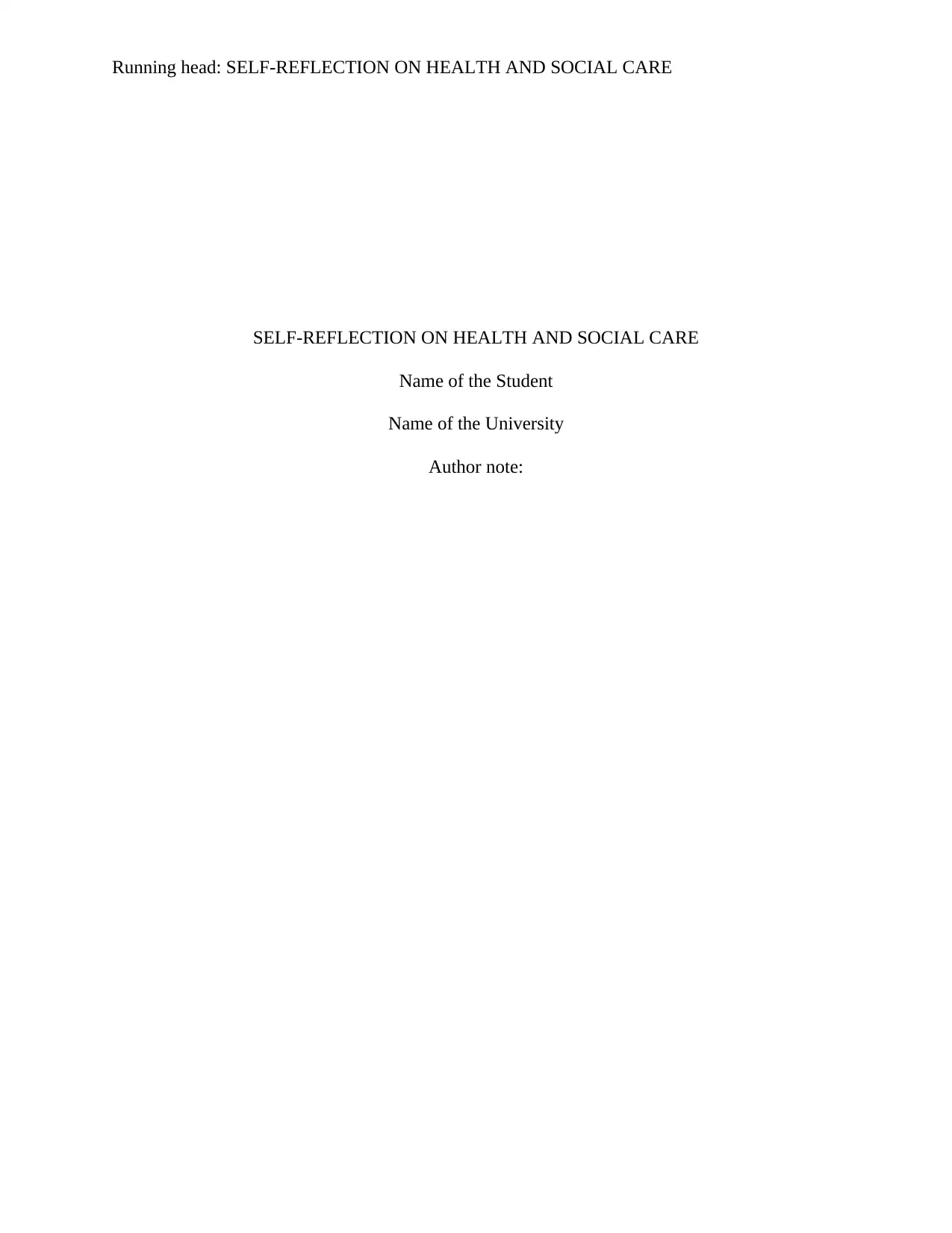
Running head: SELF-REFLECTION ON HEALTH AND SOCIAL CARE
SELF-REFLECTION ON HEALTH AND SOCIAL CARE
Name of the Student
Name of the University
Author note:
SELF-REFLECTION ON HEALTH AND SOCIAL CARE
Name of the Student
Name of the University
Author note:
Paraphrase This Document
Need a fresh take? Get an instant paraphrase of this document with our AI Paraphraser
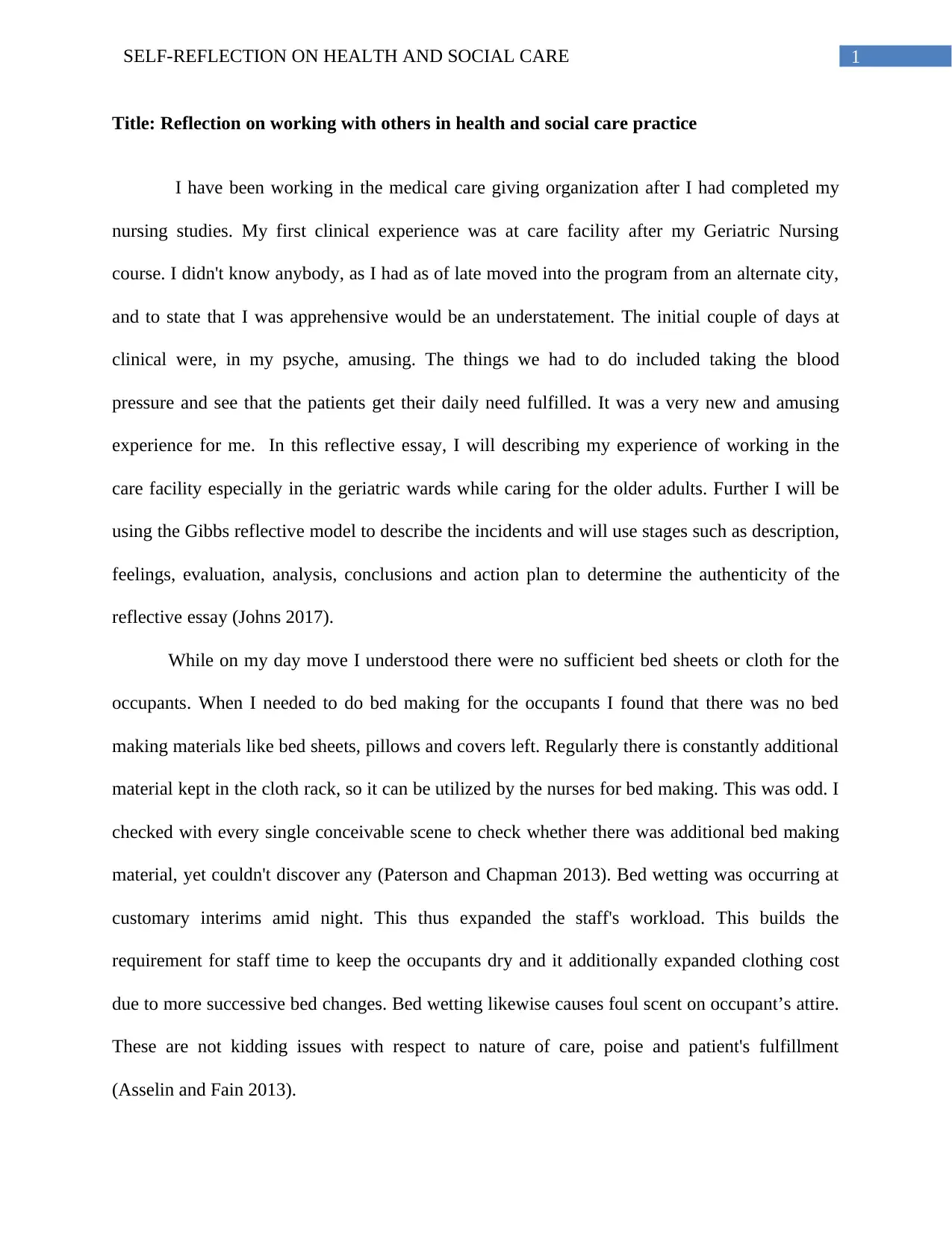
1SELF-REFLECTION ON HEALTH AND SOCIAL CARE
Title: Reflection on working with others in health and social care practice
I have been working in the medical care giving organization after I had completed my
nursing studies. My first clinical experience was at care facility after my Geriatric Nursing
course. I didn't know anybody, as I had as of late moved into the program from an alternate city,
and to state that I was apprehensive would be an understatement. The initial couple of days at
clinical were, in my psyche, amusing. The things we had to do included taking the blood
pressure and see that the patients get their daily need fulfilled. It was a very new and amusing
experience for me. In this reflective essay, I will describing my experience of working in the
care facility especially in the geriatric wards while caring for the older adults. Further I will be
using the Gibbs reflective model to describe the incidents and will use stages such as description,
feelings, evaluation, analysis, conclusions and action plan to determine the authenticity of the
reflective essay (Johns 2017).
While on my day move I understood there were no sufficient bed sheets or cloth for the
occupants. When I needed to do bed making for the occupants I found that there was no bed
making materials like bed sheets, pillows and covers left. Regularly there is constantly additional
material kept in the cloth rack, so it can be utilized by the nurses for bed making. This was odd. I
checked with every single conceivable scene to check whether there was additional bed making
material, yet couldn't discover any (Paterson and Chapman 2013). Bed wetting was occurring at
customary interims amid night. This thus expanded the staff's workload. This builds the
requirement for staff time to keep the occupants dry and it additionally expanded clothing cost
due to more successive bed changes. Bed wetting likewise causes foul scent on occupant’s attire.
These are not kidding issues with respect to nature of care, poise and patient's fulfillment
(Asselin and Fain 2013).
Title: Reflection on working with others in health and social care practice
I have been working in the medical care giving organization after I had completed my
nursing studies. My first clinical experience was at care facility after my Geriatric Nursing
course. I didn't know anybody, as I had as of late moved into the program from an alternate city,
and to state that I was apprehensive would be an understatement. The initial couple of days at
clinical were, in my psyche, amusing. The things we had to do included taking the blood
pressure and see that the patients get their daily need fulfilled. It was a very new and amusing
experience for me. In this reflective essay, I will describing my experience of working in the
care facility especially in the geriatric wards while caring for the older adults. Further I will be
using the Gibbs reflective model to describe the incidents and will use stages such as description,
feelings, evaluation, analysis, conclusions and action plan to determine the authenticity of the
reflective essay (Johns 2017).
While on my day move I understood there were no sufficient bed sheets or cloth for the
occupants. When I needed to do bed making for the occupants I found that there was no bed
making materials like bed sheets, pillows and covers left. Regularly there is constantly additional
material kept in the cloth rack, so it can be utilized by the nurses for bed making. This was odd. I
checked with every single conceivable scene to check whether there was additional bed making
material, yet couldn't discover any (Paterson and Chapman 2013). Bed wetting was occurring at
customary interims amid night. This thus expanded the staff's workload. This builds the
requirement for staff time to keep the occupants dry and it additionally expanded clothing cost
due to more successive bed changes. Bed wetting likewise causes foul scent on occupant’s attire.
These are not kidding issues with respect to nature of care, poise and patient's fulfillment
(Asselin and Fain 2013).
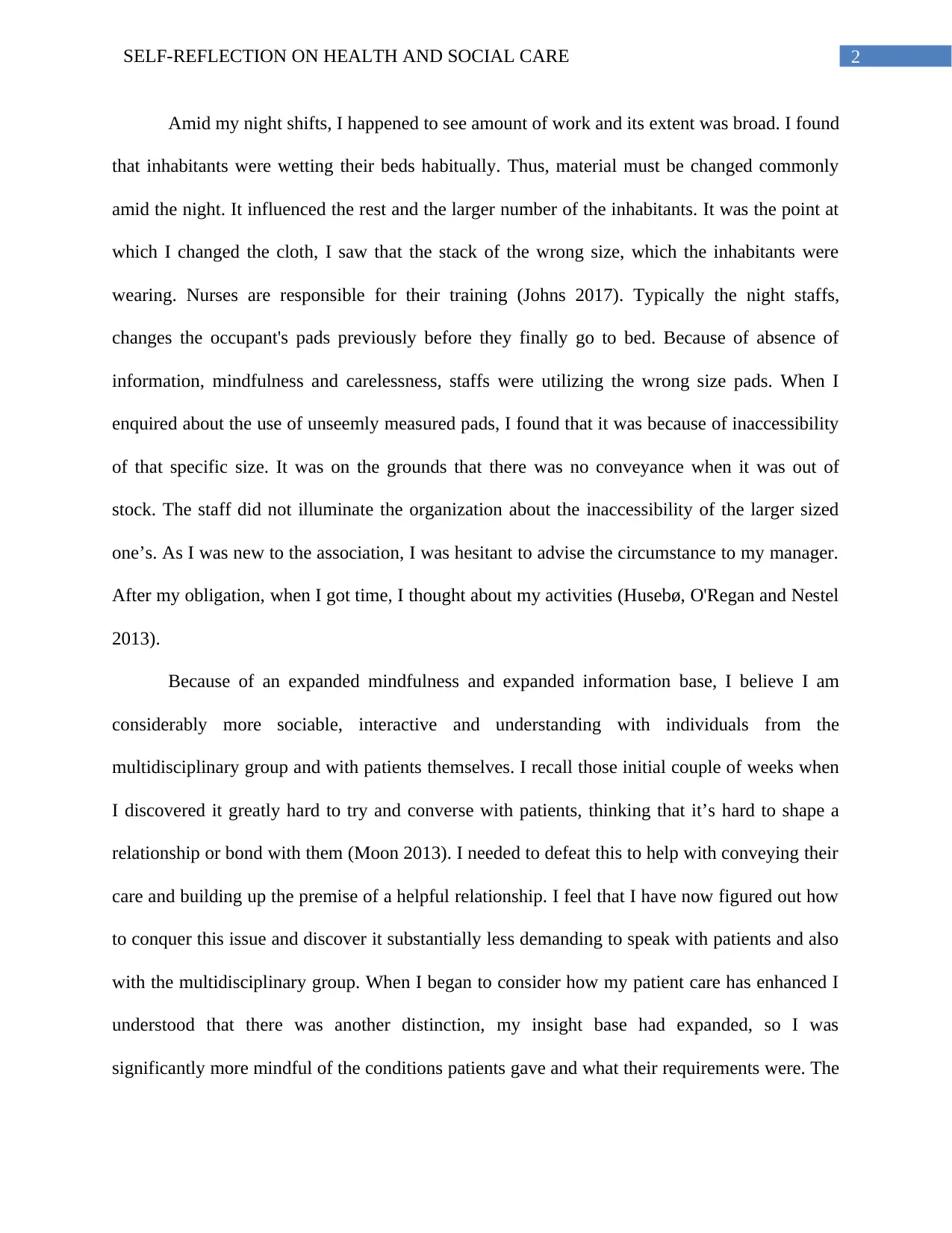
2SELF-REFLECTION ON HEALTH AND SOCIAL CARE
Amid my night shifts, I happened to see amount of work and its extent was broad. I found
that inhabitants were wetting their beds habitually. Thus, material must be changed commonly
amid the night. It influenced the rest and the larger number of the inhabitants. It was the point at
which I changed the cloth, I saw that the stack of the wrong size, which the inhabitants were
wearing. Nurses are responsible for their training (Johns 2017). Typically the night staffs,
changes the occupant's pads previously before they finally go to bed. Because of absence of
information, mindfulness and carelessness, staffs were utilizing the wrong size pads. When I
enquired about the use of unseemly measured pads, I found that it was because of inaccessibility
of that specific size. It was on the grounds that there was no conveyance when it was out of
stock. The staff did not illuminate the organization about the inaccessibility of the larger sized
one’s. As I was new to the association, I was hesitant to advise the circumstance to my manager.
After my obligation, when I got time, I thought about my activities (Husebø, O'Regan and Nestel
2013).
Because of an expanded mindfulness and expanded information base, I believe I am
considerably more sociable, interactive and understanding with individuals from the
multidisciplinary group and with patients themselves. I recall those initial couple of weeks when
I discovered it greatly hard to try and converse with patients, thinking that it’s hard to shape a
relationship or bond with them (Moon 2013). I needed to defeat this to help with conveying their
care and building up the premise of a helpful relationship. I feel that I have now figured out how
to conquer this issue and discover it substantially less demanding to speak with patients and also
with the multidisciplinary group. When I began to consider how my patient care has enhanced I
understood that there was another distinction, my insight base had expanded, so I was
significantly more mindful of the conditions patients gave and what their requirements were. The
Amid my night shifts, I happened to see amount of work and its extent was broad. I found
that inhabitants were wetting their beds habitually. Thus, material must be changed commonly
amid the night. It influenced the rest and the larger number of the inhabitants. It was the point at
which I changed the cloth, I saw that the stack of the wrong size, which the inhabitants were
wearing. Nurses are responsible for their training (Johns 2017). Typically the night staffs,
changes the occupant's pads previously before they finally go to bed. Because of absence of
information, mindfulness and carelessness, staffs were utilizing the wrong size pads. When I
enquired about the use of unseemly measured pads, I found that it was because of inaccessibility
of that specific size. It was on the grounds that there was no conveyance when it was out of
stock. The staff did not illuminate the organization about the inaccessibility of the larger sized
one’s. As I was new to the association, I was hesitant to advise the circumstance to my manager.
After my obligation, when I got time, I thought about my activities (Husebø, O'Regan and Nestel
2013).
Because of an expanded mindfulness and expanded information base, I believe I am
considerably more sociable, interactive and understanding with individuals from the
multidisciplinary group and with patients themselves. I recall those initial couple of weeks when
I discovered it greatly hard to try and converse with patients, thinking that it’s hard to shape a
relationship or bond with them (Moon 2013). I needed to defeat this to help with conveying their
care and building up the premise of a helpful relationship. I feel that I have now figured out how
to conquer this issue and discover it substantially less demanding to speak with patients and also
with the multidisciplinary group. When I began to consider how my patient care has enhanced I
understood that there was another distinction, my insight base had expanded, so I was
significantly more mindful of the conditions patients gave and what their requirements were. The
⊘ This is a preview!⊘
Do you want full access?
Subscribe today to unlock all pages.

Trusted by 1+ million students worldwide
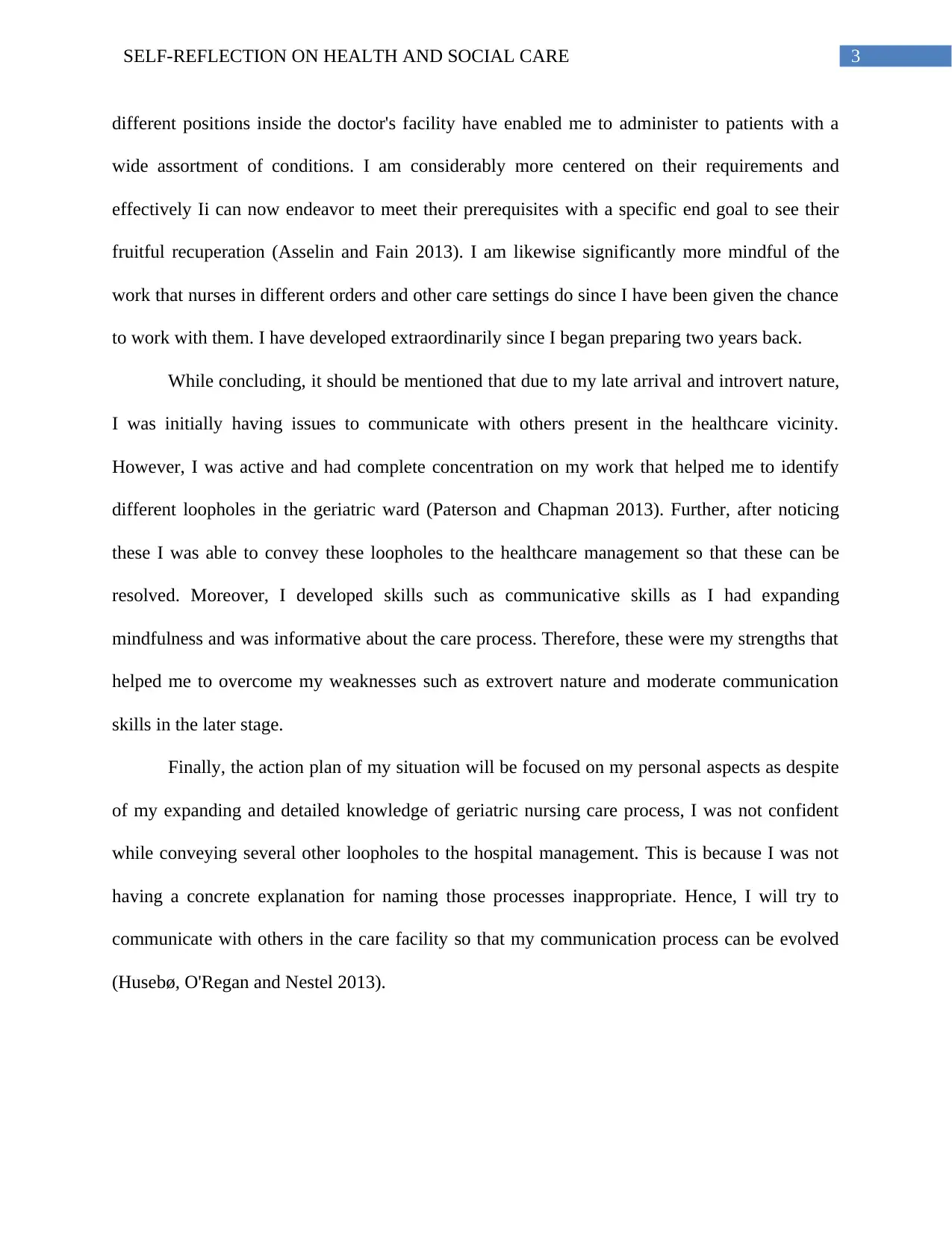
3SELF-REFLECTION ON HEALTH AND SOCIAL CARE
different positions inside the doctor's facility have enabled me to administer to patients with a
wide assortment of conditions. I am considerably more centered on their requirements and
effectively Ii can now endeavor to meet their prerequisites with a specific end goal to see their
fruitful recuperation (Asselin and Fain 2013). I am likewise significantly more mindful of the
work that nurses in different orders and other care settings do since I have been given the chance
to work with them. I have developed extraordinarily since I began preparing two years back.
While concluding, it should be mentioned that due to my late arrival and introvert nature,
I was initially having issues to communicate with others present in the healthcare vicinity.
However, I was active and had complete concentration on my work that helped me to identify
different loopholes in the geriatric ward (Paterson and Chapman 2013). Further, after noticing
these I was able to convey these loopholes to the healthcare management so that these can be
resolved. Moreover, I developed skills such as communicative skills as I had expanding
mindfulness and was informative about the care process. Therefore, these were my strengths that
helped me to overcome my weaknesses such as extrovert nature and moderate communication
skills in the later stage.
Finally, the action plan of my situation will be focused on my personal aspects as despite
of my expanding and detailed knowledge of geriatric nursing care process, I was not confident
while conveying several other loopholes to the hospital management. This is because I was not
having a concrete explanation for naming those processes inappropriate. Hence, I will try to
communicate with others in the care facility so that my communication process can be evolved
(Husebø, O'Regan and Nestel 2013).
different positions inside the doctor's facility have enabled me to administer to patients with a
wide assortment of conditions. I am considerably more centered on their requirements and
effectively Ii can now endeavor to meet their prerequisites with a specific end goal to see their
fruitful recuperation (Asselin and Fain 2013). I am likewise significantly more mindful of the
work that nurses in different orders and other care settings do since I have been given the chance
to work with them. I have developed extraordinarily since I began preparing two years back.
While concluding, it should be mentioned that due to my late arrival and introvert nature,
I was initially having issues to communicate with others present in the healthcare vicinity.
However, I was active and had complete concentration on my work that helped me to identify
different loopholes in the geriatric ward (Paterson and Chapman 2013). Further, after noticing
these I was able to convey these loopholes to the healthcare management so that these can be
resolved. Moreover, I developed skills such as communicative skills as I had expanding
mindfulness and was informative about the care process. Therefore, these were my strengths that
helped me to overcome my weaknesses such as extrovert nature and moderate communication
skills in the later stage.
Finally, the action plan of my situation will be focused on my personal aspects as despite
of my expanding and detailed knowledge of geriatric nursing care process, I was not confident
while conveying several other loopholes to the hospital management. This is because I was not
having a concrete explanation for naming those processes inappropriate. Hence, I will try to
communicate with others in the care facility so that my communication process can be evolved
(Husebø, O'Regan and Nestel 2013).
Paraphrase This Document
Need a fresh take? Get an instant paraphrase of this document with our AI Paraphraser
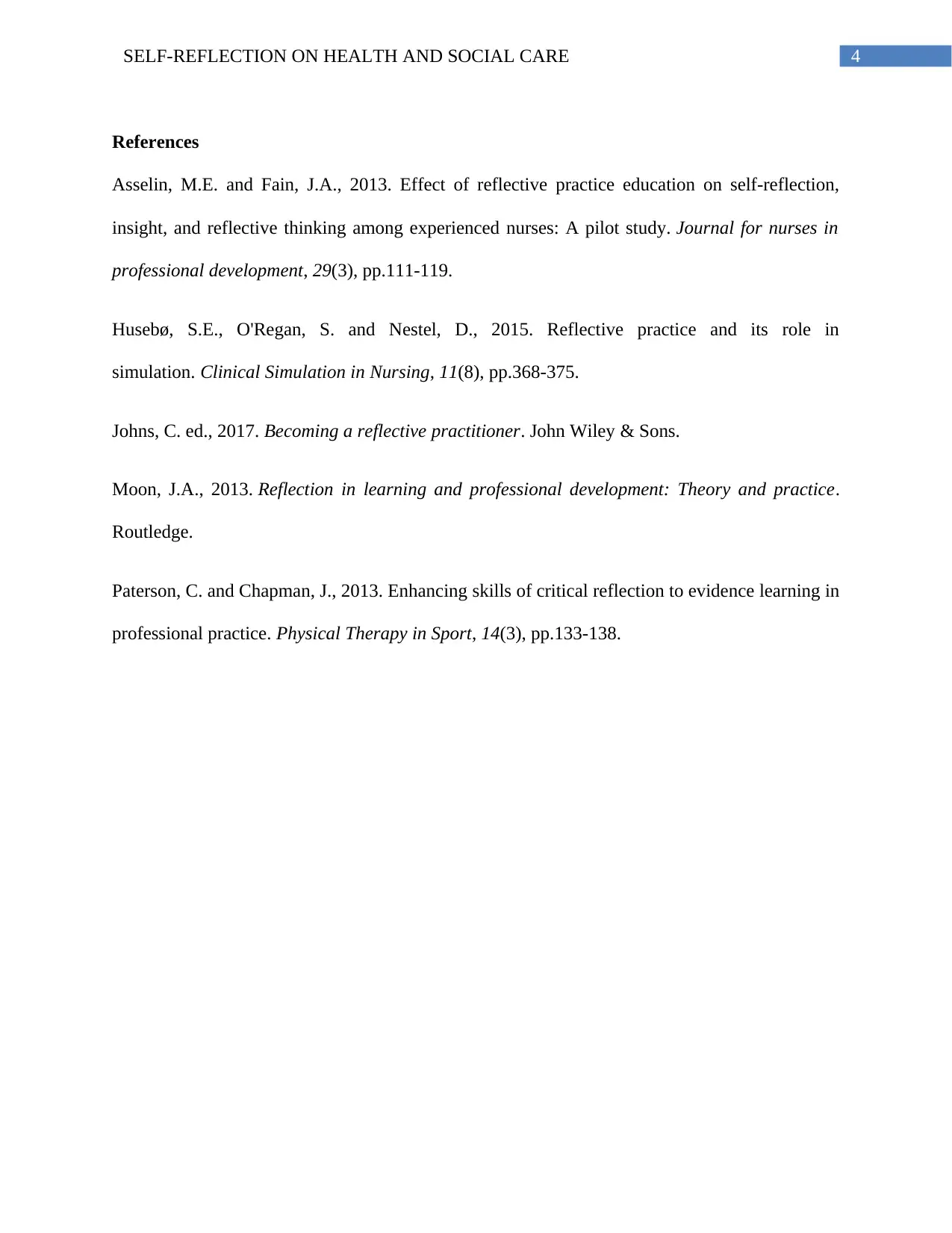
4SELF-REFLECTION ON HEALTH AND SOCIAL CARE
References
Asselin, M.E. and Fain, J.A., 2013. Effect of reflective practice education on self-reflection,
insight, and reflective thinking among experienced nurses: A pilot study. Journal for nurses in
professional development, 29(3), pp.111-119.
Husebø, S.E., O'Regan, S. and Nestel, D., 2015. Reflective practice and its role in
simulation. Clinical Simulation in Nursing, 11(8), pp.368-375.
Johns, C. ed., 2017. Becoming a reflective practitioner. John Wiley & Sons.
Moon, J.A., 2013. Reflection in learning and professional development: Theory and practice.
Routledge.
Paterson, C. and Chapman, J., 2013. Enhancing skills of critical reflection to evidence learning in
professional practice. Physical Therapy in Sport, 14(3), pp.133-138.
References
Asselin, M.E. and Fain, J.A., 2013. Effect of reflective practice education on self-reflection,
insight, and reflective thinking among experienced nurses: A pilot study. Journal for nurses in
professional development, 29(3), pp.111-119.
Husebø, S.E., O'Regan, S. and Nestel, D., 2015. Reflective practice and its role in
simulation. Clinical Simulation in Nursing, 11(8), pp.368-375.
Johns, C. ed., 2017. Becoming a reflective practitioner. John Wiley & Sons.
Moon, J.A., 2013. Reflection in learning and professional development: Theory and practice.
Routledge.
Paterson, C. and Chapman, J., 2013. Enhancing skills of critical reflection to evidence learning in
professional practice. Physical Therapy in Sport, 14(3), pp.133-138.
1 out of 5
Related Documents
Your All-in-One AI-Powered Toolkit for Academic Success.
+13062052269
info@desklib.com
Available 24*7 on WhatsApp / Email
![[object Object]](/_next/static/media/star-bottom.7253800d.svg)
Unlock your academic potential
Copyright © 2020–2025 A2Z Services. All Rights Reserved. Developed and managed by ZUCOL.




